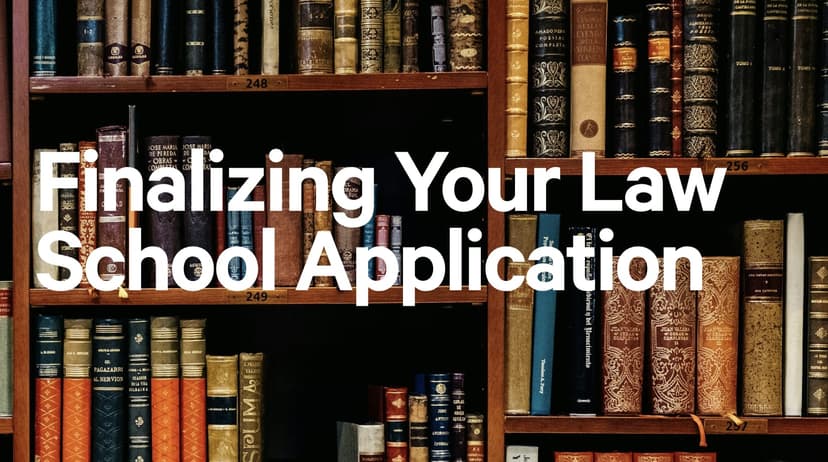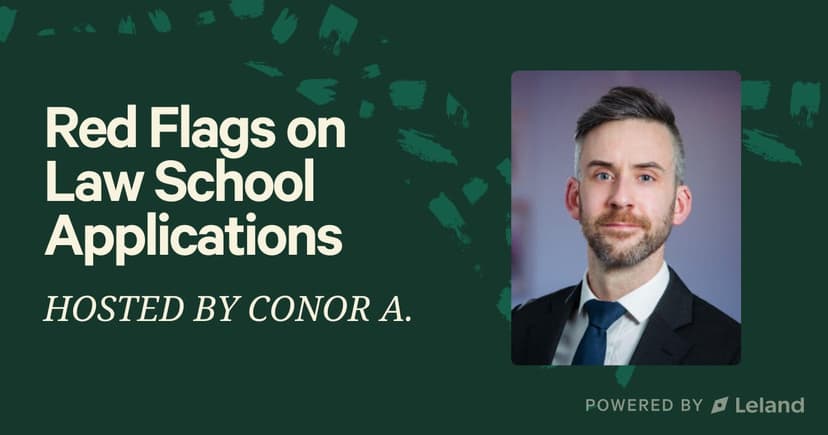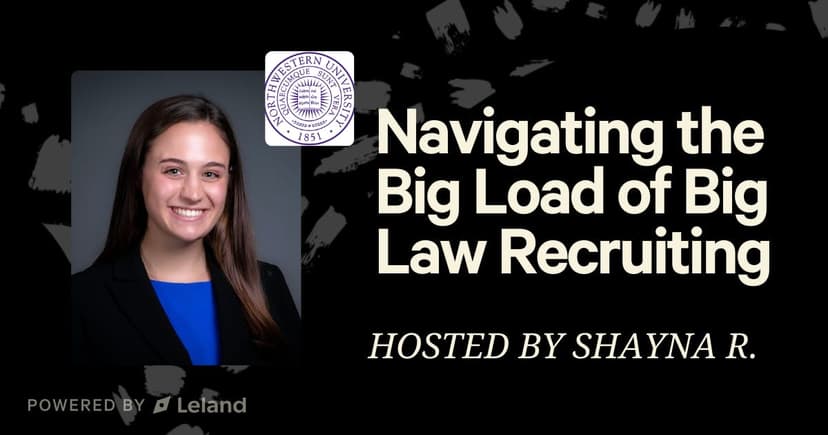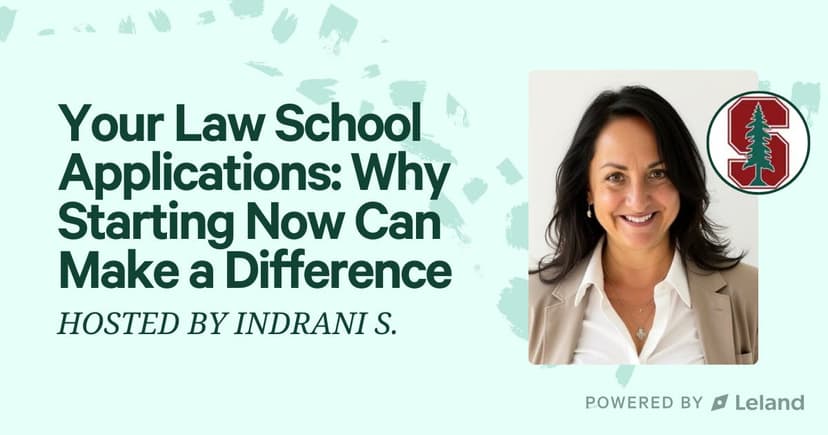How to Ace the Cornell Law School Interview
If you're applying to Cornell Law School, you'll want to read this comprehensive guide to the interview process.
Posted June 13, 2025

Join a free event
Learn from top coaches and industry experts in live, interactive sessions you can join for free.
Table of Contents
The Cornell Law School interview is a critical component of the law school admissions process, offering applicants the opportunity to stand out in a competitive field. As one of the top law schools in the United States, Cornell evaluates candidates not only on their academic abilities but also on their communication skills, professionalism, and readiness for the demands of a legal education. This guide provides a tactical approach to preparing for and excelling in the interview.
About Cornell Law School’s Interview Process
The Cornell Law School interview process is designed to assess applicants holistically. While the admissions committee reviews application materials such as transcripts, personal statements, and resumes, the interview provides an opportunity to evaluate a candidate’s interpersonal skills, motivations, and readiness for graduate school in real time.
This step is particularly significant for scholarship applicants and early-decision applicants. Cornell’s approach to interviews is similar to that of other prestigious institutions like Harvard Law School (HLS) and Columbia Law School (CLS), which also place a strong emphasis on assessing applicants beyond their academic achievements.
Cornell conducts virtual or in-person interviews, depending on the applicant’s location and the admissions team’s preferences. While most applicants are invited to interview based on strong credentials, this process serves as a decisive opportunity to make a lasting and favorable impression.
Preparation Tips For The Cornell Law School (CLS) Interview
Preparation is strongly encouraged for a successful Cornell Law School interview. Applicants should dedicate sufficient prep time to:
Research Cornell Law School
A thorough understanding of Cornell Law School is crucial. Familiarize yourself with the school’s mission, values, and academic offerings, including its legal research programs, clinics, and specializations like corporate law or public interest law. Highlighting how these align with your career goals during the interview will demonstrate genuine interest and strategic intent. Additionally, identifying unique features such as student housing, scholarship opportunities, or notable faculty members can set you apart.
Equally important is researching your interviewer’s professional background. Whether they are a faculty member, admissions officer, or alumni, understanding their expertise and areas of interest can help you anticipate the types of interview questions they may ask. Platforms like LinkedIn or the law school’s website are excellent resources for gathering this information, which can also provide common ground for building rapport during the interview.
Practice compelling responses
Confidence and composure during the interview come from preparation and practice. Participating in mock interviews is highly recommended, as it allows you to refine your responses, improve timing, and receive constructive feedback. Practicing answers to typical Cornell Law School interview questions, such as why you want to attend Cornell or how your academic background has prepared you for law school, will help you articulate your thoughts clearly.
Additionally, anticipate tricky or thought-provoking questions that assess your creativity and critical thinking skills. For instance, you might be asked to propose a new law or discuss how you would address a current legal issue. The key is to remain calm and logical while demonstrating your analytical abilities and passion for the legal profession.
Read: How to Answer the Most Common Law School Interview Questions
Dress professionally
Your attire is a critical component of making a positive first impression. A well-fitted suit, business dress, or blazer with dress slacks in neutral colors such as navy, gray, or black is ideal for both in-person and virtual interviews. This professional appearance conveys seriousness and respect for the process.
Ensure your clothing is clean, pressed, and free of wrinkles, and avoid bold patterns or excessive accessories that could distract from the conversation. Even for virtual interviews, dressing professionally is essential. Set up a clean, well-lit environment for the call, and ensure your camera placement highlights your polished appearance. Professional attire underscores your readiness for the demands of Cornell Law School.
Observe time management and punctuality
Managing your time effectively on interview day is essential for setting the right tone. Arriving at the interview location or logging into the virtual platform at least 10 minutes early demonstrates respect for the interviewer’s time and shows that you are organized and prepared. Use this extra time to review any notes, calm your nerves, and ensure all necessary materials are accessible.
Punctuality not only helps you make a strong first impression but also reflects your professionalism, a quality highly valued by the admissions committee members and essential for success in the legal profession.
Organize supporting materials
Having your materials in order ensures you can confidently reference them during the interview. Be sure to have copies of your resume and personal statement readily available, as these documents often serve as the basis for the interviewer’s questions. Organizing these in advance will allow you to respond promptly and accurately if they are mentioned during the conversation.
Additionally, preparing a list of thoughtful questions to ask the interviewer can showcase your genuine interest in the school. These might include inquiries about Cornell’s clinics, alumni support networks, or opportunities for hands-on legal experience, all of which demonstrate that you’ve done your research and are serious about your application.
Practice nonverbal communication
Nonverbal communication plays a vital role in shaping your interviewer’s impression. Maintaining consistent eye contact conveys confidence and attentiveness, while natural hand gestures can help emphasize your points without appearing over-rehearsed. Sitting with good posture signals professionalism and readiness, further reinforcing your commitment to the process.
By practicing these nonverbal cues ahead of time, you can ensure that your body language complements your spoken responses, creating a cohesive and positive impression. These subtle but important details can make a significant difference in the overall success of your interview.
Prepare questions for the interviewer
When asked if you have any questions during your Cornell Law School interview, you are presented with a valuable opportunity to gain deeper insights into the school and assess whether it aligns with your career goals. Thoughtful questions not only help you evaluate the program but also demonstrate your enthusiasm, preparation, and genuine interest in Cornell.
Here are some examples of insightful questions to consider:
- “What can first-year students expect during their initial weeks at Cornell Law in terms of assignments, training, or onboarding activities?”
- “What does a typical day look like for a Cornell Law student balancing coursework, practical training, and extracurricular activities?”
- “What are some of the most exciting or impactful projects currently being undertaken by Cornell Law students or faculty?”
- “What distinguishes Cornell Law in terms of faculty and alumni involvement with students and opportunities for mentorship?”
- “Where do you see Cornell Law evolving in the next five years in areas like curriculum, alumni engagement, or contributions to the legal field?”
- “Are there specific resources or activities you recommend for incoming students to excel during their first year at Cornell Law?”
- “What is one thing you wish you had known about Cornell Law when you first started, and how would that advice benefit new students?”
Expert tip: If you’re looking to refine your questions and ensure you make the most of your interview opportunity, consider working with top law school admissions coaches who can provide personalized guidance and expert strategies tailored to your goals.
Typical Interview Questions and How to Respond
The Cornell Law School interview process often includes standard, situational, and thought-provoking questions. Below are common questions with actual example answers to help guide your preparation and ensure you are ready to answer questions thoughtfully and confidently.
1. Why are you interviewing with us?
Example answer: “I’m drawn to Cornell Law because of its strong focus on experiential learning, particularly through its impressive clinic programs like the First Amendment Clinic. As someone passionate about advocating for free speech, I see these opportunities as invaluable to my development. Additionally, Cornell’s commitment to fostering a collaborative community aligns with my personal values and learning style.”
2. Why did you go to law school?
Example answer: “My decision to attend law school stemmed from my experiences volunteering with a nonprofit organization that provided legal assistance to underserved communities. I saw firsthand how access to legal resources could change lives, and I realized that I wanted to be part of that change. Pursuing a legal career allows me to combine my passion for advocacy with my skills in critical thinking and research.”
3. What are your greatest strengths? Weaknesses?
Example answer “My greatest strength is my ability to break down complex legal issues into clear, actionable solutions, which I honed during my internship at [specific organization]. For example, I developed research briefs that helped clients better understand their legal options, which ultimately improved case outcomes.”“A weakness I’ve identified is that I sometimes take on too much responsibility in group projects. However, I’ve been actively working on improving my delegation skills by clearly defining team roles and trusting others to handle their tasks effectively.”
4. Tell me about yourself.
Example answer: “I grew up in [city], where I developed an interest in law while participating in my high school’s mock trial program. I pursued a degree in Political Science at [university], where I gained experience in legal research and public policy. My internship with [organization] deepened my passion for advocating for marginalized communities, and I believe Cornell Law’s resources and network will help me achieve my goals.”
5. How do you work under pressure?
Example answer: “I’ve found that working under pressure brings out my ability to prioritize and stay focused. During my time at [organization], I managed multiple deadlines while preparing research for a case hearing. By creating a detailed schedule and maintaining clear communication with my supervisor, I successfully delivered high-quality work on time.”
6. What do you see yourself doing in five years?
Example answer: “In five years, I see myself practicing corporate law at a mid-sized firm, focusing on mergers and acquisitions. I plan to use the skills I gain at Cornell Law to contribute to complex transactions and build long-term client relationships while staying engaged in pro bono work that supports small businesses.”
7. How do you feel about research? Writing? Client contact?
Example answer: “I enjoy research and writing because they allow me to analyze legal issues deeply and craft compelling arguments. At the same time, I value client contact for the opportunity it provides to connect directly with individuals, understand their needs, and ensure that legal solutions are both practical and meaningful.”
8. What accomplishments in your life have given you the most satisfaction?
Example answer: “One of my proudest accomplishments was organizing a community legal aid event during my internship at [organization]. I coordinated with attorneys, handled logistics, and contributed to helping over 50 attendees access free legal consultations. Seeing the immediate impact of that event was incredibly rewarding.”
9. Why should we hire you?
Example answer: “You should hire me because I bring a combination of strong academic performance, real-world experience, and a passion for serving others. At [organization], I developed skills in legal research, teamwork, and client interaction, all of which I am eager to build upon at Cornell Law. I’m committed to making meaningful contributions to the school’s community and excelling in the opportunities it provides.”
10. Do you have any questions?
Example answer: “Yes, I do. Could you share more about the mentoring opportunities available for students, particularly with alumni? Also, are there specific clinics or externship programs that focus on public interest law, which I’m very passionate about?”
Key Strategies for Making a Lasting Impression
To leave a lasting impression, applicants should:
- Maintain eye contact and engage with their interviewer respectfully, showing confidence and attentiveness.
- Be authentic and articulate, allowing your passion for the legal profession to shine through while remaining personable and approachable.
- Demonstrate thorough research by referencing specific programs, faculty, or initiatives at Cornell that align with your career goals.
- Highlight your unique qualities, sharing specific anecdotes or experiences that distinguish you from other candidates.
- Ask thoughtful questions that show curiosity about the school and its community while reinforcing your genuine interest in attending Cornell Law.
- Present yourself professionally, not only in your attire but also in your demeanor, communication style, and punctuality.
- Express enthusiasm and confidence, conveying your excitement about the opportunity while remaining humble and reflective.
- Follow up with a personalized thank-you note, referencing specific points from the interview to show that you were engaged and appreciated the conversation.
How to Avoid Common Mistakes
Several mistakes can hinder an applicant’s performance. To avoid them:
- Be prepared for all types of interview questions, including tricky or situational ones, by practicing in advance and reviewing your application materials thoroughly.
- Understand Cornell’s culture and values, ensuring you can articulate why you are a good fit for their community.
- Avoid appearing over-rehearsed, which can make your responses seem robotic or insincere. Aim for a natural, conversational tone.
- Don’t speak negatively about other schools, employers, or personal experiences, as it can leave a poor impression.
- Manage your nerves effectively, as excessive anxiety may impact your ability to think clearly and communicate effectively.
- Avoid being overly casual or too formal; instead, strike a professional yet approachable balance.
- Clarify your answers if needed, instead of leaving a vague response. It’s better to pause briefly to organize your thoughts than to ramble or provide incomplete information.
- Show genuine enthusiasm for Cornell Law School, avoiding any behavior that might suggest disinterest or a lack of effort in the admissions process.
What Happens Next?
Following the Cornell Law interview, the admissions office reviews the performance as part of a broader evaluation, which includes a candidate’s LSAT scores, academic record, and extracurricular achievements. While acceptance into Cornell Law School is highly competitive, the interview can be the deciding factor in distinguishing one applicant from another.
For those not admitted, pursuing opportunities at other law schools, gaining additional experience during a gap year, or refining application materials for the next admissions cycle can pave the way for future success.
Read: How to Get Into Law School: Advice from an Expert
Pave a Path to Success with Expert Guidance
The Cornell Law School interview is a pivotal step in the application process, offering candidates an invaluable opportunity to showcase their strengths, address potential weaknesses, and distinguish themselves in a competitive applicant pool.
For those seeking additional support, working with experienced law school admissions coaches can make a tremendous difference. These experts provide personalized guidance, help refine your interview strategy, and ensure every aspect of your application reflects your full potential. With the right preparation and professional support, you can take confident steps toward achieving your goal of attending Cornell Law School or another esteemed institution.
Read next:
- A Guide to the Yale Law School Interview Process
- A Guide to the University of California--Berkeley School of Law Interview Process
FAQs
Does Cornell Law interview all applicants?
- They invite those applicants whom we are strongly considering for admission to conduct a Kira Online Assessment. In-person interviews in lieu of Cornell’s standardized online assessments are not conducted by their Admissions Committee as a matter of equity and fairness to all applicants.
Does Cornell care about interviews?
- It's important to note that Cornell's interviews are not required, and your application will still be considered without one. Interviews are usually offered on a first-come, first-served basis and depend on the availability of alumni interviewers in your region.
How hard is it to get into Cornell law school?
- Cornell Law School is challenging to get into; only around 1.4 out of every 10 applicants are offered admission. While they receive around 5,000 applicants each year, only a select few successfully meet Cornell's rigorous standards.
How many Cornell applicants get interviews?
- Do all Cornell applicants get an interview? No, because Cornell receives so many applications and doesn't have enough interviewers or time to interview everyone, only around 30% of applicants get an interview.
Is Cornell law prestigious?
- Cornell University is ranked No. 14 (tie) out of 196 in Best Law Schools. Schools were assessed on their performance across a set of widely accepted indicators of excellence.
What is the 25th percentile for Cornell Law School?
- The 1L class at Cornell University has a median LSAT of 172. The 25th percentile LSAT is 169 and the 75th percentile LSAT is 175. The median GPA is 3.9. The 25th percentile GPA is 3.78 and the 75th percentile GPA is 3.97.
Does Cornell look at demonstrated interest?
- No. Cornell does not track or consider "demonstrated interest" in the admission process. Of course, we encourage prospective students to learn about the university.
What does Cornell Law look for?
- Remember that the median GPA for the recent matriculants at Cornell was 3.89, so you want to have a similar GPA or higher. LSAT/GRE/GMAT: Cornell Law School is one of the few law schools that accepts all three standardized tests for admission. You are only required to submit scores for one of these three exams.
What personality does Cornell look for?
- Collaboration. Empathy. Curiosity. Your values are important to Cornell.
What are the strengths of Cornell Law School?
- In addition to being prolific scholars, their professors are committed to the classroom. With a low student-faculty ratio, you'll have more opportunities to interact with and get to know your professors than at most top law schools.
Browse hundreds of expert coaches
Leland coaches have helped thousands of people achieve their goals. A dedicated mentor can make all the difference.



















